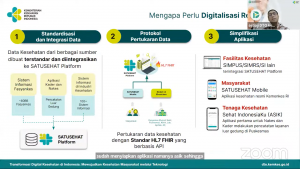
Thursday, 26 October 2023, the Master of Public Health Science Study Program Specializing in Health Service Quality, Faculty of Public Health (FPH) Universitas Indonesia (UI) held an online seminar entitled “Transformation of Primary Health Service Quality, Challenges and Opportunities in the Digitalization Era”.
“Of course, you need to remember that primary service is the first and foremost, if the service and quality are not efficient it will certainly have an impact on other services, such as a decline in services in the community,” said Expert Staff to the Minister for Health Technology, Setiaji, S.T., M.Si., gave a speech and opened the seminar. “Therefore, it is important to strengthen the foundation of primary services, starting from uniform information systems or standardization so that existing health data can be integrated, and services can be controlled properly, making it easier to diagnose or determine further treatment,” he continued.

Law Number 40 of 2004 concerning SJSN (Article 24 paragraph 3), states that social security administering bodies develop health service systems, service quality control systems and health service payment systems to increase the efficiency and effectiveness of health insurance. “Let’s develop our intelligence to improve the quality of health services, monitoring and evaluating quality requires intellectual intelligence and social intelligence so that it influences good relations between sectors. “Happy thinking, towards better quality,” said Dr. Adang Bachtiar, M.P.H., D.Sc., Chair of the FPH UI Public Health Service Quality Study Group, in his speech.
Dra. Rahmi Purwakaningsih, M.Kes., Chair of the Primary Health Services Quality Working Team, Health Services Quality Directorate, discussed policies and quality systems for primary health services. “Health transformation aims to implement the president’s vision, namely a healthy, productive, independent and just society,” said Dra. Rahmi. This is related to the policy direction of the 2020-2024 RPJMN, namely improving health services towards universal health coverage, especially strengthening basic health services (Primary Health Care) by encouraging increased promotive and preventive efforts supported by innovation and the use of technology. “Health service facilities are obliged to continuously and continuously improve the quality of health services internally and externally,” he continued.

The urgency of digitalization in health services is based on three core problems, namely difficulties in finding data from manual medical records, health services that are not effective and efficient because they spend time waiting for paper documents, and health service governance that is not optimal because of the difficulty in making decisions with real data. A digitalization system is also needed as a form of standardization and integration of data, data exchange protocols, and simplification of applications for health facilities, communities, and health workers. “In fact, the focus of the 2023 health technology transformation is to increase the development and implementation of health technology transformation in a real way and have an impact on all Indonesian society. “The SATUSEHAT platform integration target is 2023, focusing on all regions of Indonesia with a target of 30,000 health facilities,” said Setiaji, in the second topic, realizing public health through technology.

Furthermore, talking about the quality of health services is of course closely related to the services provided to individuals or populations with the aim of improving health outcomes. This primary service facility is the spearhead in creating a healthy society. Community empowerment through increasing community awareness and participation in the health sector must be an important part of the primary health care system. Balance score is also one of the strategies in primary health transformation targets that can be carried out. Strengthening primary services in individual and population health efforts certainly prioritizes promotive and preventive actions. According to Dr. Sulung Mulia Putra, M.P.H., the use of information technology is very important for community health centers. “The number of Cengkareng residents, which has reached 600,000 people, requires health workers to have technology-based innovation in order to provide maximum service to all Cengkareng residents,” said Dr. Eldest, Head of Cengkareng Community Health Center, on the third material topic. (DFD)

